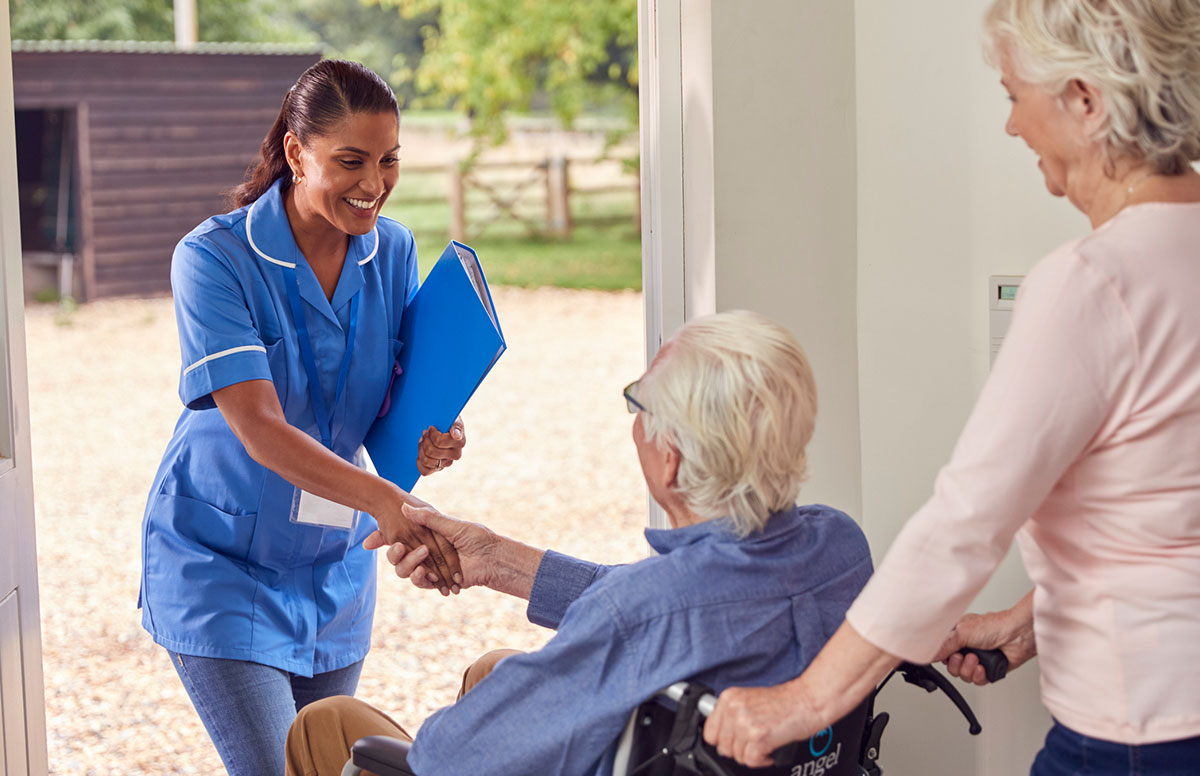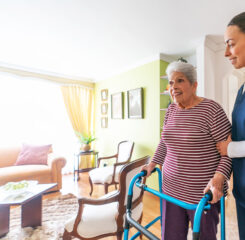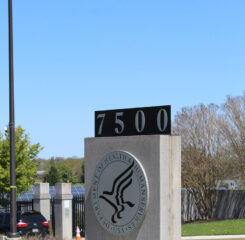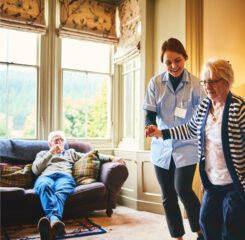LeadingAge Nursing Home Advisory Group – June 2021
David Wilkinson, Rachel Diaz, and Christine Cannon from Yale University Tobin Center for Economic Policy joined the Nursing Home Advisory Group call on June 29, 2021 to discuss the Protect Nursing Homes Project. The presentation was then followed by policy updates from LeadingAge staff and a facilitated discussion with group participants on COVID-19 vaccination reporting. This month’s call also featured a special extended discussion on the Medicare Payment Advisory Commission (MedPAC) review of the Skilled Nursing Facility (SNF) Value Based Payment (VBP) program.
Protect Nursing Homes Project
David Wilkinson, Executive Director of the Yale University Tobin Center for Economic Policy, introduced call participants to the Protect Nursing Homes tool. This tool, developed under a grant from the Rockefeller Foundation and now funded by Yale University, can help nursing home operators identify infection control risks related to shared staff. Mr. Wilkinson was joined by Rachel Diaz, Project Coordinator for the Tobin Center, and Christine Cannon, Project Director for the Protect Nursing Homes Project.
Mr. Wilkinson stated that staff shared between nursing homes has long been identified as an infection control concern but data on staff sharing and the degree of risk it poses to nursing homes is extremely limited. The Protect Nursing Homes Project set out to change that by curating data and making it available to nursing homes to aid in infection control and prevention practices.
Using anonymized cell phone data, the project helps a given nursing home identify other nursing homes with which it is “connected”, meaning other nursing homes in which the given nursing home’s staff are working, and the strength of this connection. The more staff that are shared with a given nursing home, the stronger the connection appears.
Recognizing concerns over privacy, Mr. Wilkinson stressed that the tool does not individually identify employees. Developed at a time when visitors were restricted from nursing homes, the tool is based on anonymized cell phone data that is sold to commercial providers, overlapped with geo-location data of CMS-certified nursing homes identified through publicly available data. Connections were identified by measuring the extent to which a smartphone was identified in 2 or more nursing homes.
Mr. Wilkinson stated that because of the known risk of infection transmission between staff and residents, and the increased risk of transmissibility caused by shared staff, the tool can also act as an early warning system. When an outbreak is identified at a nursing home, connected nursing homes could immediately adjust infection control practices in response to better prevent subsequent outbreaks.
This tool is currently free and the research team continues work on the project with potential for additional resources in the future. For more information, visit www.protectnursinghomes.org.
Policy Updates
Interim Final Rule on Vaccination and Therapeutics Reporting. CMS-3414-IFC was published to the federal register in May and requires nursing homes to provide education and offer the COVID-19 vaccine to residents and staff. The rule additionally requires nursing homes to report COVID-19 vaccination rates and resident therapeutic use to CDC through the NHSN system. The rule went into effect May 21 and enforcement was slated for June 14 but was delayed at the last minute to June 21. The Nursing Home Advisory Group held a special call on June 3 to discuss the rule. LeadingAge will be submitting comments to the federal register prior to the July 12 deadline and encourages members to do the same. We have developed this resource to assist members in submitting comments. Additionally, we have developed this resource to assist with compliance with this rule and have updated our NHSN reporting cheat sheet based on issues that we have identified in working with member in recent weeks.
FY 2022 SNF PPS Proposed Rule. LeadingAge submitted comments on the FY 2022 SNF PPS proposed rule to the federal register on June 6. Read these comments here.
Emergency Preparedness – Actual Emergency Exemption. In September 2019, CMS updated the emergency preparedness requirements for all providers. One update to the requirements was the actual emergency exemption, which exempts a provider from performing the next required full-scale exercise following activation of the emergency plan due to an actual man-made or natural emergency. In September 2020, CMS released a memo stating that the COVID-19 public health emergency (PHE) qualified as an actual emergency and providers who activated their emergency plans due to the COVID-19 PHE met criteria for the actual emergency exemption. LeadingAge followed up with CMS in March 2021 to determine if a provider would be exempt for a second exercise cycle if the provider continued operations under the emergency plan due to the same emergency (the COVID-19 PHE). At the time, CMS stated that no, a provider could not use the exemption for the same emergency twice. However, in June 2021, CMS revised memo QSO-20-41-ALL to allow providers to use this exemption for a second cycle if they continue to operate under the emergency plan.
Observation Stays Bills. Companion bills were re-introduced in the House and Senate this month on observation stays. These bills would allow for any time spent in the hospital, including time spent in outpatient observation status, to count toward the 3-day stay required for SNF Medicare A services. Notes that the 3-day staff remains waived at this time due to a federal 1135 waiver and these bills would address the requirement after the waiver expires.
Telehealth Bill. A bi-partisan bill was introduced in the Senate that would make permanent current telehealth flexibilities under the Medicare program. This includes allowing audio-only telehealth services, waiving geographic restrictions to receiving telehealth services in the home, allowing for new services for critical access hospitals and other rural providers, and more.
OSHA Emergency Temporary Standard. The US Department of Labor released the OSHA Emergency Temporary Standard effective June 21 to protect healthcare workers and other workers who are at risk for contracting COVID-19. Provisions go into effect in July and include conducting a hazard assessment, having a written plan to mitigate spread, providing respirators and other personal protective equipment to staff, requirements for social distancing and physical barriers, paid time off for vaccination and recovery, and remove work or paid time off for illness. Some exemptions exist for fully vaccinated workers and certain providers. More information can be found here. LeadingAge’s Cory Kallheim will join the Nursing Home Advisory Group call in July to review provisions and discuss implementation.
MedPAC Review and Recommendations for SNF VBP Program. The Medicare Payment Advisory Commission met in June to review the SNF Value Based Purchasing (VBP) program. The MedPAC identified several flaws with the current program and proposed replacing the VBP program with a new Value Incentive Payment (VIP) program. For more information and to provide feedback on the proposed SNF VIP program, please reach out to Nicole Fallon nfallon@leadingage.org.
Member Feedback
LeadingAge sought additional feedback on vaccination reporting under the new interim final rule CMS-3414-IFC. Noting that additional reporting is extremely burdensome on nursing home providers, many of whom continue to struggle with workforce shortages, outbreak prevention, and mitigation measures, feedback from members and comments submitted to the federal register thus far seem to indicate a preference for alternative means of reporting. Suggestions that appear to have wide stakeholder support would be reporting resident vaccination rates on the Minimum Data Set (MDS) and reporting staff vaccination rates through payroll-based journal (PBJ). These 2 options were discussed on the call, noting that both alternatives would alter the frequency and quantity of data collected compared to the current rule.
LeadingAge will be submitting comments on this rule ahead of the July 12 deadline. We continue to welcome feedback on these issues. If you are a LeadingAge nursing home member and wish to provide feedback or would like information on how to join this group, please email Jodi Eyigor jeyigor@leadingage.org. Our next monthly call will take place Tuesday, July 27 at 2pm ET.
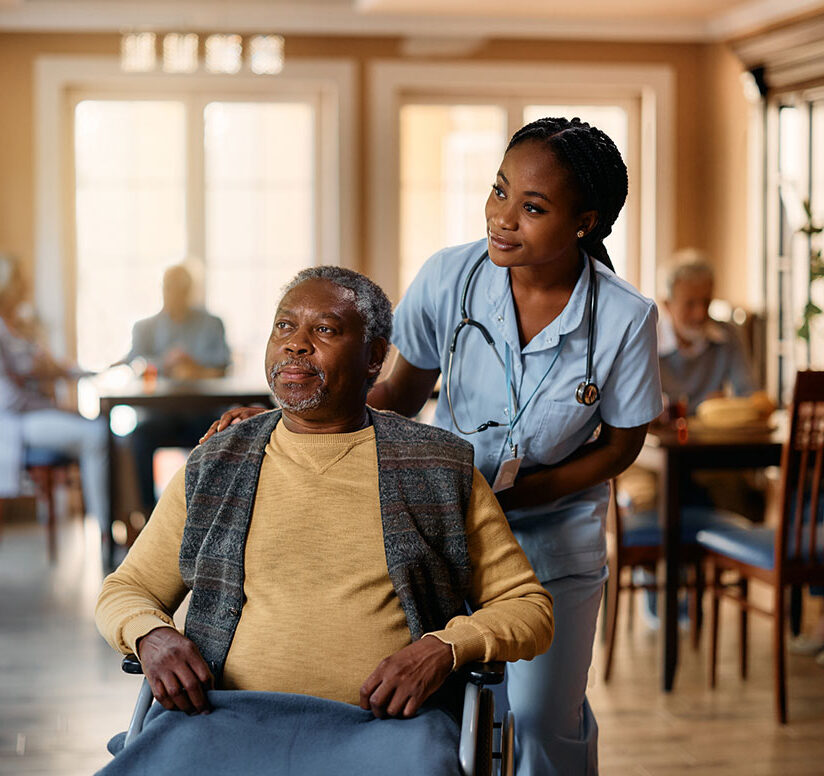
Most Recommended
October 15, 2025
 Shutdown Week Three: Impact of Ongoing Closure on Affordable Housing
Shutdown Week Three: Impact of Ongoing Closure on Affordable Housing
December 10, 2025
Fiscal Year (FY) Funding 2026
October 07, 2025
Immigrant Workforce Matching Program Brings Workforce Relief
Recently Added
December 29, 2025
 RHT Program Awards: All 50 States To Receive Funds, Says CMS
RHT Program Awards: All 50 States To Receive Funds, Says CMS
December 29, 2025
 CMS Publishes Draft OASIS-E2 Guidance Manual
CMS Publishes Draft OASIS-E2 Guidance Manual
December 23, 2025
 CMS Debuts Models: ACCESS, ELEVATE and LEAD
CMS Debuts Models: ACCESS, ELEVATE and LEAD
December 22, 2025
